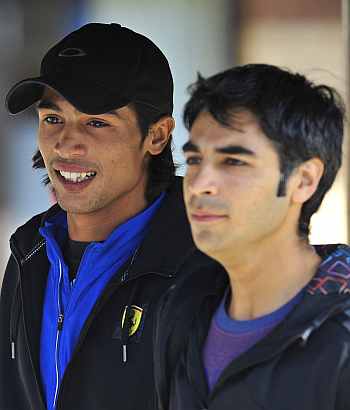 | « Back to article | Print this article |
ICC Anti-Corruption Tribunal chairman Michael Beloff on Wednesday explained the procedures that will be adopted at the full hearing of the Pakistani players involved in the spot-fixing scandal.
Salman Butt, Mohammad Asif and Mohammad Aamer are all set to face an anti-corruption tribunal from January 6-in Doha with threat of life bans looming over.
Beloff, along with justice Albie Sachs from South Africa, and Kenyan Sharad Rao, will decide whether the Pakistani trio were actually involved in bowling deliberate no-balls during last year's tour of England.
 Over the next six days, Beloff said, the procedure will follow rules that have been designed to ensure all parties get a full and fair opportunity to present their case.
Over the next six days, Beloff said, the procedure will follow rules that have been designed to ensure all parties get a full and fair opportunity to present their case.
"The hearing will begin with the ICC making an opening statement, presenting its case against each of the three players. And in turn, each of the player will also be given a chance to respond," Beloff briefed the media on the eve of the hearing on Wednesday.
"The ICC will present all of the evidence that it has prepared in support of the charges it has brought. It will include hearing from witnesses 'in person' and over the telephone.
"If any witness evidence is disputed by the players, they are each entitled to challenge (by cross-examination) any part of that witness evidence. Members of the tribunal will also be able to ask questions to any witness," he added.
Beloff said once the ICC presents its case, the players would be given the chance to defend themselves.
"The players will then get a chance to present their defence. In so doing, they would be required to give 'in person' evidence before the tribunal and will be subject to cross-examination by counsel for the other players (if required) and then by the ICC," he said.
"The members of the tribunal will also be able to ask questions of any witnesses provided by the players in support of their defence, including the players themselves. Hence, each party shall be entitled to make a closing statement on the issue of whether the charges should be upheld," he added.
The English barrister said once both parties finish their deliberation, the tribunal will deliver its judgment after careful observation.
"Thereafter, the tribunal will retire to deliberate in private on the issue of whether the charges against any of the players should be upheld. If time allows, it will again return to advise the parties verbally of its ruling. But if not, it will reserve judgment.
"If the tribunal is able to give judgment on whether any of the charges against the players have been upheld prior to the end of the day on 11 January 2011, and in that judgment it upholds any charges against any player, if time allows and the tribunal concurs, the Player(s) in question and the ICC will then address the tribunal on the issue of the sanction(s) (if any) that should be imposed and any costs order that should be made.
"The tribunal will then retire to deliberate in private on the issue of sanctions and costs. If time allows, it will then return to advise the parties verbally of any ruling on sanctions and costs. If not, it will reserve judgment.
"If the tribunal advises the parties of its decision on whether any of the charges against the players have been upheld and/or on sanctions and costs before the end of the hearing, then the ICC will publicly announce that decision, in the form directed by the tribunal," he added.
The three players were provisionally suspended by the ICC in October after a British tabloid reported their alleged involvement in spot-fixing at the lord's Test during Pakistan's tour of England.
The world governing body's code of conduct carries a minimum five-year ban if corruption charges are proved.